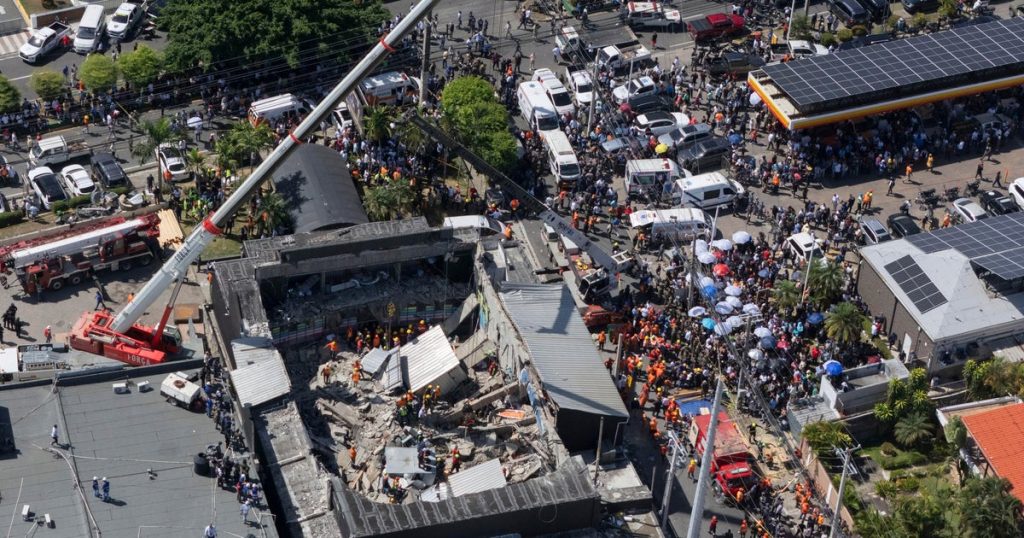A nightclub owner and his sister have been arrested in connection with a tragic incident in the Dominican Republic where the club’s roof collapsed in April, resulting in the death of 236 individuals and injuring over 180 others. The arrests of Antonio Espaillat and Maribel Espaillat follow accusations of negligence, as the Attorney General’s Office alleges that they failed to prevent the disaster. The investigation into the exact cause of the collapse continues, with concerns raised over the club’s structural integrity and adherence to safety standards.
| Article Subheadings |
|---|
| 1) Arrest Details and Accusations |
| 2) The Investigation Into Structural Safety |
| 3) The Impact of the Collapse |
| 4) The Nightclub’s Legacy and Popularity |
| 5) Official Responses and Future Actions |
Arrest Details and Accusations
On Thursday, authorities apprehended Antonio Espaillat, owner of the nightclub Jet Set in Santo Domingo, along with his sister Maribel Espaillat. Although neither has yet been charged with a crime, law enforcement officials have stated they will present any charges to a judge within the next 48 hours. The Dominican Republic’s Attorney General’s Office has issued a statement indicating that both individuals exhibited “immense irresponsibility and negligence” by not taking necessary actions to prevent the roof’s collapse, which tragically led to the loss of 236 lives and numerous injuries. Prosecutors also allege that the Espaillats attempted to manipulate or intimidate employees who may serve as witnesses in this ongoing investigation.
The Investigation Into Structural Safety
The tragic event has initiated a thorough investigation by a government-appointed committee, which includes experts from various fields. This committee is tasked with understanding the root causes behind the roof’s collapse. During an interview conducted shortly after the collapse, Antonio Espaillat stated that his family had been operating the nightclub for approximately 30 years. He mentioned that no state authority, engineer, or architect had ever performed a structural review on the building during that time. He did, however, claim that inspections focusing on basic safety and licensing had been conducted by firefighters and city officials. This raises significant concerns regarding the nightclub’s adherence to construction codes and safety regulations that are essential for public venues.
The Impact of the Collapse
The collapse on April 8 sent shockwaves throughout the Dominican Republic and the larger Caribbean community, leaving families mourning the loss of loved ones. Crews worked diligently for over 53 hours, managing to rescue 189 survivors trapped in the debris. The tragic incident struck hard not just at the operational heart of the Jet Set nightclub, but also deep within the cultural fabric of the nation. Among the deceased were prominent figures such as beloved singer Rubby Pérez, who was performing when the roof caved in, and Nelsy Cruz, the governor of Montecristi province and sister of renowned MLB All-Star Nelson Cruz. Other high-profile victims included former MLB pitcher Octavio Dotel, a retired U.N. official, and notable designer Martín Polanco. Their untimely deaths have prompted heightened discussions around safety measures in entertainment venues across the country.
The Nightclub’s Legacy and Popularity
Jet Set was more than just a nightclub; it was a cultural institution that had been operational for nearly five decades. Renowned for its lively Monday night merengue parties, the venue attracted both local and international celebrities, establishing itself as a staple of nightlife in Santo Domingo. Patrons took pride in the vibrant atmosphere, which brought together diverse crowds and celebrated Dominican culture through music and dance. The club’s closure following the collapse not only raises questions about the future of the establishment but also casts a shadow on the significant role it played in local entertainment.
Official Responses and Future Actions
In the aftermath of the tragic collapse, various official bodies have begun to reevaluate safety regulations imposed on public venues in the Dominican Republic. The government aims to ensure that such incidents do not recur by reinforcing inspection protocols. An attorney representing the Espaillats could not be reached for immediate comment, hinting at potential legal complexities forthcoming as this high-profile case unfolds. Furthermore, the community is left asking critical questions regarding responsibility and accountability, with many calling for swift action to bring justice to the victims’ families.
| No. | Key Points |
|---|---|
| 1 | The nightclub roof collapse in April resulted in 236 deaths and over 180 injuries. |
| 2 | Owner Antonio Espaillat and his sister were arrested for negligence. |
| 3 | Authorities are investigating the structural integrity of the nightclub. |
| 4 | The event has sparked discussions on public venue safety regulations. |
| 5 | The nightclub was a cultural institution in Santo Domingo, known for popular merengue events. |
Summary
The roof collapse at Jet Set nightclub serves as a stark reminder of the importance of structural safety and accountability in public venues, especially those that host large gatherings. As the investigation unfolds and the community grapples with mourning the loss of beloved individuals, there is an urgent need for systemic changes to ensure that such tragedies are prevented in the future. The Espaillats’ case represents a pivotal moment in addressing issues of negligence and public safety standards in the Dominican Republic.
Frequently Asked Questions
Question: What caused the nightclub roof to collapse?
The exact cause of the roof collapse is still under investigation by a government-appointed committee that includes international experts.
Question: Who were some of the notable victims of the incident?
Among the victims were prominent figures, including singer Rubby Pérez, MLB players Octavio Dotel and Nelsy Cruz, and designer Martín Polanco.
Question: What actions are being taken to ensure safety in public venues moving forward?
The government is reevaluating safety regulations and inspection protocols for public venues in response to the tragedy.


